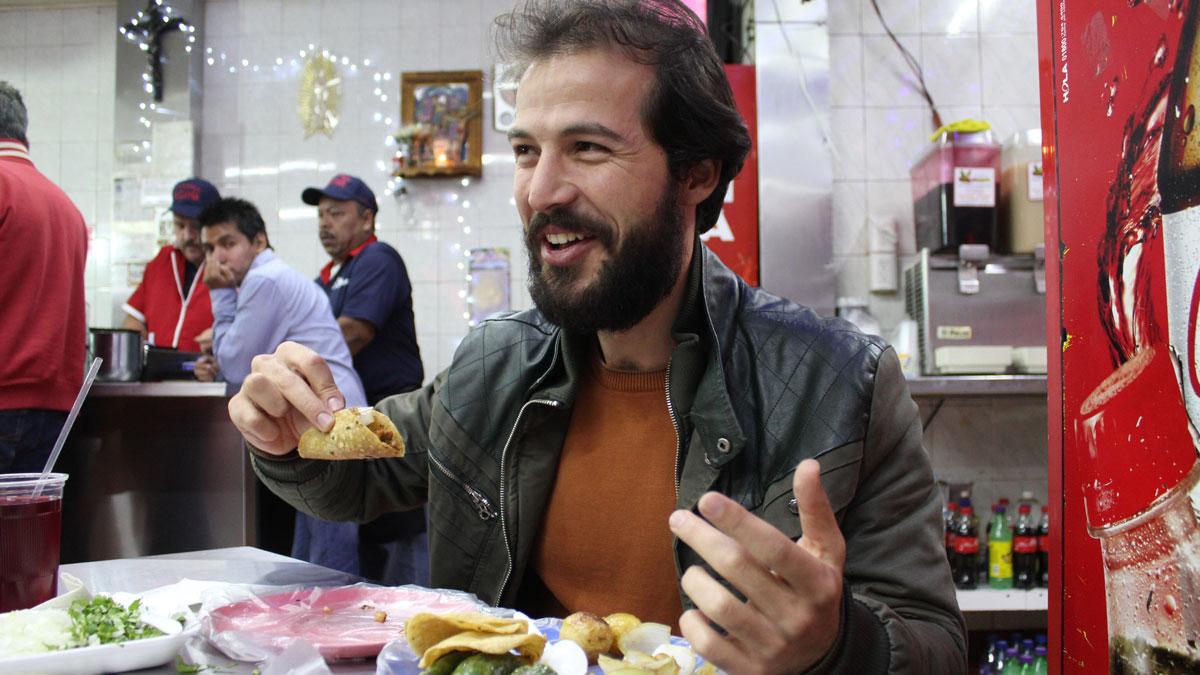Essa Hassan is the first student to participate in Project Habesha, a Mexico City-based project that offers Syrians scholarships to study in Mexico. He lives and studies in the city of Aguascalientes in central Mexico.
We’ve heard about Syrians trying to find places to resettle in Europe and the United States. Then, there are Syrians such as Essa Hassan, 27, landing in less typical places — like Mexico.
Back in 2011, Hassan was in a tight spot. He had just graduated from Damascus University and his plan was to head to grad school. But he was left in limbo for several months, not yet enrolled in graduate school, and would soon be wanted for mandatory military service.
“I couldn’t delay the military service anymore,” he says. “There was no way, and I just decided to leave. Maybe I’ll never go back.”
Hassan left Syria in 2012 and drifted for a while: Istanbul, Italy and Beirut, where he worked for a non-profit and met Adrián Meléndez, who had started a new initiative called the Habesha Project. It organizes scholarships for Syrians to study in Mexico. Hassan is the project’s first student, arriving last year. The plan is to bring 30 more students this year.
Today, Hassan is settling into his new home, an old house in Aguascalientes. It’s a small mostly working class city in central Mexico, where Nissan is a major employer. It’s a safe bet that Hassan is the only Syrian for miles around.
The living room of his new home is filled with old wooden furniture and large family photos. “It reminds me of my grandparents place, almost my parents place somehow. We have the same idea of putting pictures in big frames,” he says.
In his bedroom, Hassan put up a poster of Anita Ekberg, the Swedish actress from La Dolce Vita. She’s in a short dress making coffee. “To wake up seeing a woman drinking café, it’s nice,” he says. There are also several photos of Charlie Chaplin. “The Great Dictator” is one of Hassan's favorite movies. He also has a few, just a few, books in Arabic on literature and politics.
Hassan also likes the small size of Aguascalientes. He lives just a 10-minute walk from the colonial center and shows me a favorite local taquería, La Gloria, known for its tacos al pastor. He appreciates how restaurants like this in Mexico bring you appetizers before you order (we get a plate of cucumbers, limes, potatoes and fried tortillas). It reminds him of Damascus.
“It’s about generosity,” Hassan says. “It’s a way of life. It’s not something they pretend to do.” The pork spit they use for the tacos also reminds him of shawarmas back home, except for the pineapple that marinates the meat here.
Later on, I meet the family Hassan lives with. The mom, Juana, works long days at the family’s café and just gets by. “I don’t watch much television or listen to the radio,” she says. There’s no time. She didn’t know about the Syrian war until she met Hassan, and says she’s glad he’s here.
When it comes to Mexico, Hassan knew about the drug violence, but he was also interested in the country’s history, the Mayans and Aztecs. He says he refuses to see places one way — Syria means war, Mexico means drug cartels, and how that perception can paint a population.
“When you consider a whole place a dangerous place, you are doing something unjust to the people who live there because there are always millions who have nothing to do with these crimes. I’m considered coming from a dangerous place and people, somehow, even if they don’t say it in my face, they think about it,” he says.
He also feels more at ease in Mexico than, say, Italy, where he lived for a short time. There, Hassan says, he was always an immigrant, never a foreigner. There’s a big difference, he says.
“Foreigners, they are Europeans from other countries. Or Americans. And all the others are immigrants. So it’s hard to live there. We tried, I tried,” he says.
Now, Hassan needs to learn Spanish so he can start a master’s degree. He's still not sure what to study. “I have many, many ideas. I mean, a lot,” he says. “And I always think about it. Since the conflict, really, my thought is about this. And I enjoy it. I enjoy thinking about this.”
Maybe his future will mean staying in Mexico for a while, perhaps years, or arming himself with another degree, going back to Syria one day, and using what he’s learned there.
